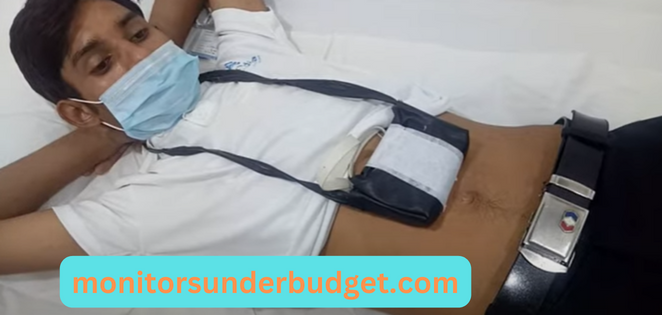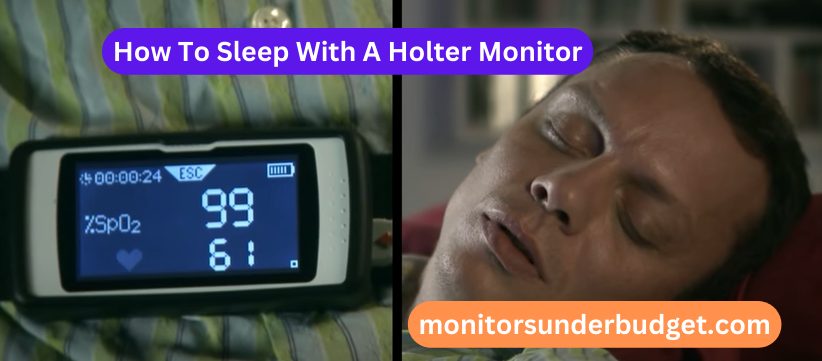Do you have to sleep with a Holter monitor? How to sleep with a Holter monitor? What are the best ways to sleep with a Holter monitor? These are all valid questions that people may have if they are scheduled to have a Holter monitor test. In this article, we will provide you with the answers to these questions and more! We will give you tips on how to make sleeping with a Holter monitor as comfortable as possible. So, whether you’re anxious about the test or just want to know how to get through it comfortably, keep reading.
1. What is a Holter Monitor and why do you need to sleep with it on?
A Holter monitor is a battery-operated portable device that records your heart’s activity for 24 to 48 hours. You wear it while you go about your normal activities.

The monitor will have sensors attached to your chest that are connected by wires to the recording device. The recorder may be worn in a pouch on your belt or over your shoulder.
You will also need to wear a small monitor called an event recorder. This monitor is worn around your neck or clipped to your belt. It records your heart’s activity when you press a button.
You may need to sleep with a Holter monitor if you have been experiencing irregular heartbeats or palpitations. Your doctor will want to know how often these episodes occur and how long they last.
Sleeping with a Holter monitor may be uncomfortable, but it is important to follow your doctor’s instructions. Here are a few tips to help you get through the night:
– Try to sleep in a comfortable position. You may need to experiment to find the position that works best for you.
– Place a pillow under your head and shoulders to help keep the wires in place.
– Try to avoid sleeping on your stomach. This can make it difficult to breathe and may cause the wires to become dislodged.
– If you are having trouble sleeping, try reading or listening to calm music before bed.
If you experience any problems with your Holter monitor, be sure to contact your doctor. Do not remove the monitor or disconnect the wires without first talking to your doctor.
With a little bit of planning, you can successfully sleep with a Holter monitor and get the information your doctor needs to help treat your condition.
2. What does a Holter monitor detect?
The monitor checks your heart rate and rhythm throughout the day and night. It also stores information about your daily activities, such as how long you sleep, how much you walk, and how often you exercise.
Your doctor can use this information to find out if you have a heart condition that needs treatment. Holter monitors are also used to check how well treatments for heart conditions are working.

If you have a heart condition, your doctor may recommend that you wear a Holter monitor for a day or two to check your heart rate and rhythm.
You may also need to wear the monitor for a longer period of time if you have symptoms that come and go, such as dizziness, fainting, or chest pain.
Some people feel self-conscious or uncomfortable wearing the monitor all day and night. But it’s important to follow your doctor’s instructions and wear the monitor as long as directed.
3. How to Sleep with a Monitor – the basics
First, let’s start with some basics. A Holter monitor is a small, portable device that records your heart’s electrical activity. You will wear it for 24 to 48 hours while you go about your normal activities.
Now that we’ve got that out of the way, let’s get into how to sleep with a Holter monitor. The first thing you need to do is find a comfortable position.

This may take some trial and error, but it’s important to find a position that doesn’t put too much pressure on the device or cause discomfort. Once you’ve found a comfortable position, try to relax and fall asleep.
If you’re having trouble sleeping, there are a few things you can try. First, make sure the monitor is securely attached. If it’s not, it can cause discomfort or even pain. Second, try using a pillow to prop up your head and shoulders so that the monitor doesn’t press against your chest.
Finally, if all else fails, try wearing earplugs or an eye mask to help block out any noise or light that might be keeping you awake.
4. What to do if you experience any problems while sleeping with a monitor
If you experience any problems while sleeping with a Holter monitor, the first thing you should do is contact your doctor. They will be able to help you troubleshoot the problem and determine if there is anything wrong with the device itself.
In some cases, the problem may be that the electrodes are not placed properly on your body. If this is the case, your doctor will be able to adjust them so that they are more comfortable for you.
Another thing to keep in mind is that it is normal to feel a little bit uncomfortable when you first start using a Holter monitor.
This is because your body is not used to having wires attached to it. However, after a few nights of use, you should get used to it and it should not be a problem.
If you are still having problems after a few nights, or if you have any other questions about how to sleep with a Holter monitor, your doctor will be able to help you. They will be able to give you more specific instructions.
5. What if your monitor falls off while sleeping?
If your Holter monitor falls off while sleeping, don’t worry! Simply put the monitor back on and continue to wear it as prescribed. If you have any questions or concerns, please contact your healthcare provider.
6. Tips for making the most of your sleep time while wearing a monitor
Here are some tips to help you cope with wearing a Holter monitor:
– Choose comfortable, loose-fitting clothes to wear over the monitor.
– Try to keep your daily routine as normal as possible.
– Take showers as usual, but avoid bathing or swimming.
– If you have to sleep, wear the monitor on your belt or shoulder instead of around your neck.
– Avoid strenuous activity and lifting heavy objects.
– Keep a diary of your activities and how you’re feeling each day. This can help your doctor understand your symptoms and how they’re related to your heart rate and rhythm.
FAQs about How to Sleep with a Holter Monitor
Can I take a shower with my Holter monitor?
Yes, you can take a shower with your Holter monitor. Just be careful not to get the monitor wet.
Can I sleep on my side with a Holter monitor?
Yes, you can sleep on your side with a Holter monitor. However, you may want to try sleeping on your back first to see if that’s more comfortable.
I’m having trouble sleeping with my Holter monitor. What should I do?
If you’re having trouble sleeping with your Holter monitor, try following the tips in this article. If that doesn’t help, talk to your doctor about other options.
Conclusion
A Holter monitor is a battery-operated device that records the heart’s electrical activity. It is typically worn for 24 to 48 hours and can be used to diagnose abnormal heart rhythms, such as atrial fibrillation or tachycardia.
If you are prescribed a Holter monitor, here are some tips on how to sleep with it: -Wear the monitor in a comfortable position -Make sure the wires are not twisted or kinked.
Avoid activities that might cause your heart rate to spikes, such as running or lifting weights -If you have any questions about using the Holter monitor, be sure to ask your doctor or nurse.
Hopefully, this article has helped you understand how to sleep with a Holter monitor. If you have any other questions, feel free to ask them in the comments section below.

